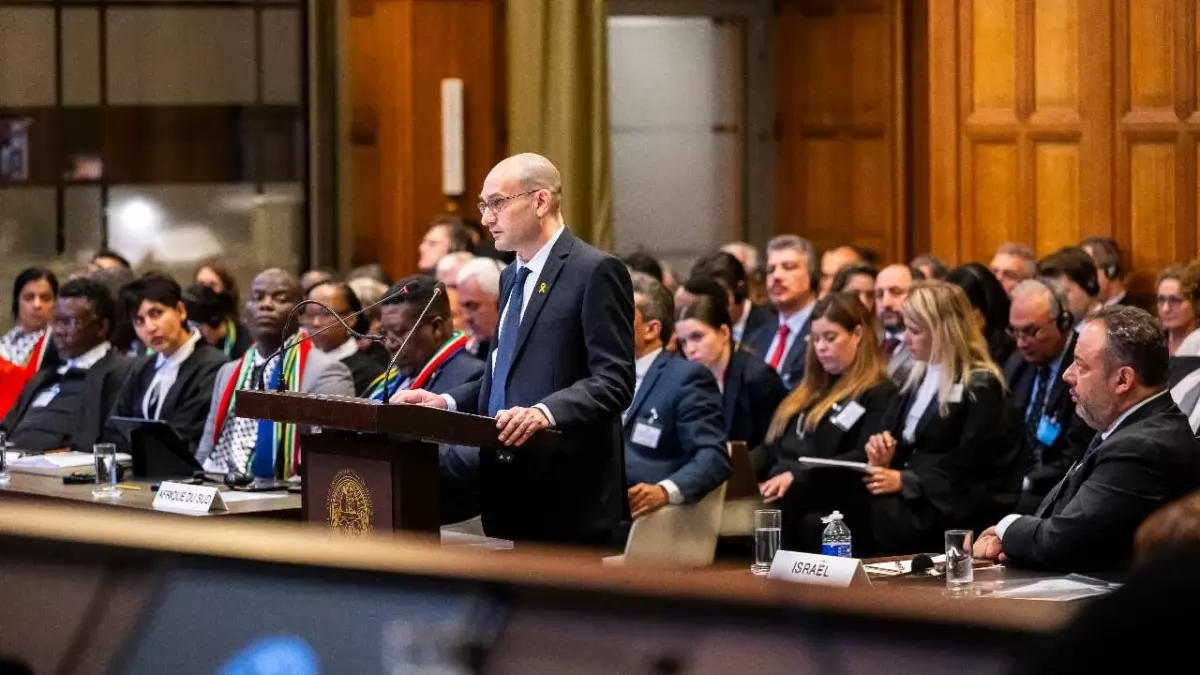
X/CIJ_ICJ
ICJ Genocide Case: In the ongoing legal proceedings before the International Court of Justice (ICJ), Israel’s representatives mounted a defense against South Africa’s genocide allegations. The case, filed by South Africa, accuses Israel of violating the UN’s 1948 Genocide Convention in the wake of its actions during the ongoing assault on Gaza.
Tal Becker, part of Israel’s legal team, began by invoking the Holocaust in his opening statements. He underscored the historical context, referencing the systematic murder of 6 million Jews as a backdrop to Israel’s defense.
Becker argued that Israel’s actions in Gaza were a response to self-defense against Hamas’s attacks on October 7. He contended that South Africa had presented a distorted picture of Israel’s actions, overlooking the context of Hamas’s actions and the threat it posed. The emphasis was on Israel’s obligation to protect its citizens.
MULTIMEDIA: photos and videos of today's hearing in the case concerning Application of the Convention on the Prevention and Punishment of the Crime of Genocide in the Gaza Strip (#SouthAfrica v. #Israel) held before the #ICJ are available here: https://t.co/lxMKBi5rqQ pic.twitter.com/EBN9H4sOYc
— CIJ_ICJ (@CIJ_ICJ) January 12, 2024
Despite Israel’s claims of acting in self-defense, the United Nations reported a stark difference in death tolls between Gaza and Israel. The figures reveal approximately 23,074 reported deaths in Gaza between October 7, 2023, and January 7, 2024, compared to 1,139 deaths in Israel during the same period.
Malcolm Shaw, a British barrister on Israel’s legal team, asserted that while Hamas’s attack didn’t grant Israel the right to breach international law, the country was within its rights to defend itself under humanitarian law. Shaw stressed that any breaches of conflict rules would be addressed within Israel’s robust legal framework.
MULTIMÉDIA: des photos et des vidéos de l'audience de ce jour en l'affaire de l'Application de la convention pour la prévention et la répression du crime de génocide dans la bande de Gaza (#AfriqueduSud c. #Israël) devant la #CIJ sont disponibles ici: https://t.co/lxMKBi5rqQ pic.twitter.com/y9emSbbSOe
— CIJ_ICJ (@CIJ_ICJ) January 12, 2024
Becker claimed that South Africa’s close relations with Hamas, designated as a terrorist organisation in several countries, influenced its perspective. The assertion was made that the petitioner country approached the matter with pre-existing contentions, characterising it as a “unispute” rather than a genuine dispute.
Galit Raguan, representing the Justice Ministry, held Hamas responsible for the high civilian death toll in Gaza. Raguan argued that Hamas strategically embedded itself in the civilian population, turning infrastructure like schools and hospitals into a terrorist stronghold. The assertion was that civilian casualties were unintended but lawful consequences of attacks on the military.
WATCH LIVE: Israel presents its oral argument on the request for the indication of provisional measures submitted by South Africa in the case #SouthAfrica v. #Israel before the #ICJ https://t.co/q8SFZM2qyd
— CIJ_ICJ (@CIJ_ICJ) January 12, 2024
Contrary to popular claims, Omri Sender argued that Israel provided humanitarian aid to civilians in Gaza, including water, food trucks, fuel, and gas. Sender contended that Israel met the legal test in ensuring the rights of civilians weren’t compromised, emphasising the allowance for the injured or sick to cross into Egypt.
Christopher Staker argued against imposing provisional measures, stating that Israel’s actions were purely in self-defense. Staker expressed concerns that such measures would hamper Israel’s ability to address security threats and rescue captives from Gaza.
As the legal battle unfolds, each side presents its case, with Israel staunchly defending its actions amidst South Africa’s accusations of genocide.
The ICJ heard the arguement from both sides including Israel and South Africa in the Gaza gineocide case. It will now move on to deliberations and is due to announce the date of the final verdict.
PRESS RELEASE: the public hearings on the request for the indication of provisional measures submitted by South Africa in the case #SouthAfrica v. #Israel concluded today before the #ICJ. The Court will now begin its deliberation https://t.co/V1nDgZABx4 pic.twitter.com/cntr81XrdU
— CIJ_ICJ (@CIJ_ICJ) January 12, 2024





Copyright © 2025 Top Indian News
